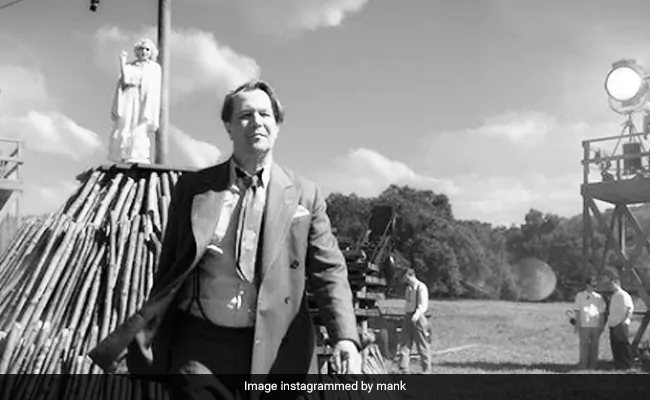Herman Mankiewicz was the Oscar-winning writer of the screenplay for Citizen Kane, widely considered the best movie ever made. Originally a New York newspaperman, he moved across the country in the 1920s, just as Hollywood was becoming an industry. He made a fortune for himself and became head of Paramount’s screenwriting department.
Mank tells the story of the screenplay for Citizen Kane and, by flashback, how he became cynical and alcoholic in the pro-cess. Mank’s screenplay was written by Jack Fincher, who died 18 years ago. He and his son, David Fincher, who directed this film, pitched the idea for years to various studios with certain ideas about how it was to look. Thus, the Mank screenplay has been waiting for nearly two decades to be produced. Fincher’s ideas were viewed as largely unacceptable until Netflix, known for disrupting the industry anyway, agreed to back the deal. And so the film was finally made, as a testimonial to the director’s father as well as a tribute to one of the world’s greatest movies.
Fincher’s technical vision for Mank was to make it look and feel like the movie that inspired it. Even though it was filmed digitally, it was converted to black-and-white. He wanted it to look so authentic that he added the little circles in the lower right corner (indicating the need for a reel change on older projecting systems), even though there are no reels! Although state-of-the-art sound recording technology was used to record the movie, a monaural soundtrack was utilized, and the sound was intentionally degraded to add pops and hisses, much like an old vinyl record. Much of the film was made at the Kemper Ranch in Victorville, California, which is exactly where Mankiewicz wrote the original script. Technically, the movie fires on all cylinders and was rewarded with six nominations. It won Oscars for best cine-matography and production design.
What I enjoyed most about the film was the sometimes comical, but often tragic portrait of the man that it painted. As Mankiewicz, Gary Oldman delivers yet another fine performance. He conveys the great wit of the man as he composes biting commentary. But he also bares his soul as he struggles to make sense of what has happened to himself in the industry that he struggled to love.
Yes, Mankiewicz did well for himself in the early years of Hollywood. But as the industry matured, it went in directions that he wasn’t at all happy with. As the Great Depression took hold, he witnessed the panic of capitalists and their destructive reactions. He believed that the film industry had more than an obligation to just make money by peddling block-busters. He believed that, through films, Hollywood could help make peoples’ lives better. He rebelled against the greed of the studio heads, and it pained him, in one scene in particular, when Louis B. Mayer is asking the company staff to take pay cuts, while avoiding entirely the question of
whether his own salary would be reduced. Indeed, the entire origin of the script for Citizen Kane may well be his expression of angst and injury at the influence of William Randolph Hearst and his newspapers in spreading false information about the “socialist” opposition in the form of Upton Sinclair. (Is there anything familiar about that?)
The film paints the man as cold and very bitter. Mankiewicz was married and fathered three children, but the film doesn’t show much of his family, so our takeaway is that they didn’t play a big role in his life. His only significant involvement with a woman, in the movie at least, is a platonic relationship with Marion Davies, Hearst’s mistress, played very well by Amanda Seyfried. While her role in this film is to soften the rough edges some-what, he remains a crusty cynic.
Not everyone will like this film. If you require a movie to have at least one person you can identify with, then you may not like Mank. From my perspective, life is full of interesting but not necessarily sympathetic characters. Mank is certainly one of them. See the movie for that. (4 Stars) Available on Netflix streaming.
Author
-

I am a retired software developer, who enjoys traveling and watching movies. I live with my wife, Joan, and our two Welsh Corgis, Fleur and Smooch. Although we lived in New Mexico for a couple of decades, we recently moved to Colorado to be closer to family. We own a small trailer and have a bucket list of more than 200 National Parks and Monuments to visit. We take long trips to see different parts of the country, stopping for a few days at each park or town that inspires us. (Our travels are documented on our website: MisterParksTravels.com ) Our most recent trip was a two-month exploration of Alaska, including a week north of the Arctic Circle. But we can’t travel all the time, so we love to watch movies together, we enjoy the movie and the conversation it generates and I began a serious practice of reviewing movies. I review Oscar-nominated am now published in three printed and online newspapers in both New and Old Mexico! The Questa del Rio News was the first to print my column and we will be forever grateful for the opportunity.
View all posts




